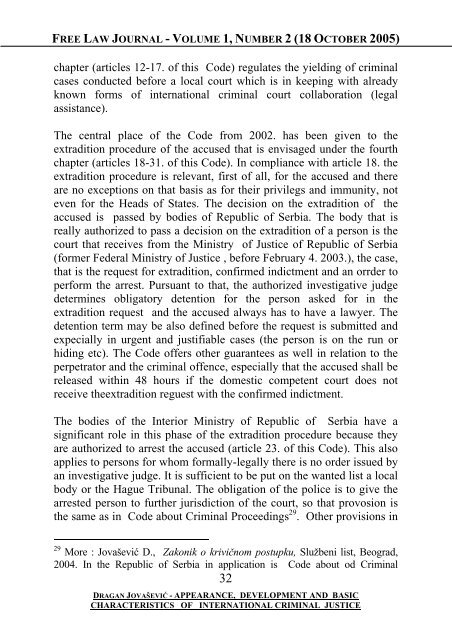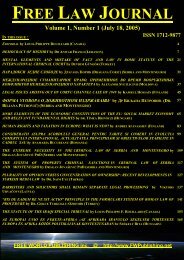FREE LAW JOURNAL Volume 1, Number 2 (October 18, 2005)
FREE LAW JOURNAL Volume 1, Number 2 (October 18, 2005)
FREE LAW JOURNAL Volume 1, Number 2 (October 18, 2005)
You also want an ePaper? Increase the reach of your titles
YUMPU automatically turns print PDFs into web optimized ePapers that Google loves.
<strong>FREE</strong> <strong>LAW</strong> <strong>JOURNAL</strong> - VOLUME 1, NUMBER 2 (<strong>18</strong> OCTOBER <strong>2005</strong>)<br />
chapter (articles 12-17. of this Code) regulates the yielding of criminal<br />
cases conducted before a local court which is in keeping with already<br />
known forms of international criminal court collaboration (legal<br />
assistance).<br />
The central place of the Code from 2002. has been given to the<br />
extradition procedure of the accused that is envisaged under the fourth<br />
chapter (articles <strong>18</strong>-31. of this Code). In compliance with article <strong>18</strong>. the<br />
extradition procedure is relevant, first of all, for the accused and there<br />
are no exceptions on that basis as for their privilegs and immunity, not<br />
even for the Heads of States. The decision on the extradition of the<br />
accused is passed by bodies of Republic of Serbia. The body that is<br />
really authorized to pass a decision on the extradition of a person is the<br />
court that receives from the Ministry of Justice of Republic of Serbia<br />
(former Federal Ministry of Justice , before February 4. 2003.), the case,<br />
that is the request for extradition, confirmed indictment and an orrder to<br />
perform the arrest. Pursuant to that, the authorized investigative judge<br />
determines obligatory detention for the person asked for in the<br />
extradition request and the accused always has to have a lawyer. The<br />
detention term may be also defined before the request is submitted and<br />
expecially in urgent and justifiable cases (the person is on the run or<br />
hiding etc). The Code offers other guarantees as well in relation to the<br />
perpetrator and the criminal offence, especially that the accused shall be<br />
released within 48 hours if the domestic competent court does not<br />
receive theextradition reguest with the confirmed indictment.<br />
The bodies of the Interior Ministry of Republic of Serbia have a<br />
significant role in this phase of the extradition procedure because they<br />
are authorized to arrest the accused (article 23. of this Code). This also<br />
applies to persons for whom formally-legally there is no order issued by<br />
an investigative judge. It is sufficient to be put on the wanted list a local<br />
body or the Hague Tribunal. The obligation of the police is to give the<br />
arrested person to further jurisdiction of the court, so that provosion is<br />
the same as in Code about Criminal Proceedings 29 . Other provisions in<br />
29<br />
More : Jovašević D., Zakonik o krivičnom postupku, Službeni list, Beograd,<br />
2004. In the Republic of Serbia in application is Code about od Criminal<br />
32<br />
DRAGAN JOVAŠEVIĆ - APPEARANCE, DEVELOPMENT AND BASIC<br />
CHARACTERISTICS OF INTERNATIONAL CRIMINAL JUSTICE

















